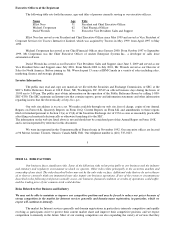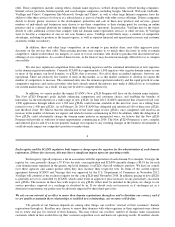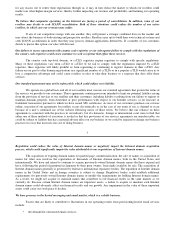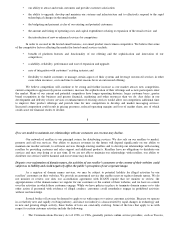Tucows 2013 Annual Report Download - page 18
Download and view the complete annual report
Please find page 18 of the 2013 Tucows annual report below. You can navigate through the pages in the report by either clicking on the pages listed below, or by using the keyword search tool below to find specific information within the annual report.
We recognize revenue from our customers ratably over the respective terms of their agreements with us as required
by GAAP. Typically, our domain name registration agreements have terms that range from one to ten years, and our website
hosting agreements have annual or month-to-month terms. Accordingly, any increases or decreases in sales during a
particular period do not translate into immediate, proportional increases or decreases in revenue during that period, and a
substantial portion of the revenue that we recognize during a quarter, is derived from deferred revenue from customer
agreements that we entered into during previous quarters. As a result, we may not generate net earnings despite substantial
sales activity during a particular period, since we are not permitted under GAAP to recognize all of the revenue from these
sales immediately, and because we are required to reflect a significant portion of our related operating expenses in full during
that period. Conversely, the existence of substantial deferred revenue may prevent deteriorating sales activity from becoming
immediately observable in our consolidated statement of operations.
15
In addition, we may not be able to adjust spending in a timely manner to compensate for any unexpected revenue
shortfall, and any significant shortfall in revenue relative to planned expenditures could negatively impact our business and
results of operations.
Currency fluctuations may adversely affect us.
Our revenue is primarily realized in U.S. dollars and a major portion of our operating expenses are paid in Canadian
dollars. Our operating results are accordingly subject to fluctuations in foreign currency exchange rates, which could
adversely affect our future operating results. We attempt to mitigate a portion of these risks through foreign currency
hedging, based on our judgment of the appropriate trade-offs among risk, opportunity and expense. We have established a
hedging program to partially hedge our exposure to foreign currency exchange rate fluctuations for Canadian Dollars.
We regularly review our hedging program and make adjustments as necessary based on the judgment factors
discussed above. Our hedging activities may not offset more than a portion of the adverse financial impact resulting from
unfavorable movement in foreign currency exchange rates, which could adversely affect our financial condition or results of
operations.
If we do not maintain a low rate of credit card chargebacks, we will face the prospect of financial penalties and could lose
our ability to accept credit card payments from customers, which would have a material adverse effect on our business,
financial condition and results of operations.
A substantial majority of our revenue originates from online credit card transactions. Under current credit card
industry practices, we are liable for fraudulent and disputed credit card transactions because we do not obtain the
cardholder’s signature at the time of the transaction, even though the financial institution issuing the credit card may have
authorized the transaction. Under credit card association rules, penalties may be imposed at the discretion of the association.
Any such potential penalties would be imposed on our credit card processor by the association. Under our contract with our
processor, we are required to reimburse our processor for such penalties. Our current level of fraud protection, based on our
fraudulent and disputed credit card transaction history, is within the guidelines established by the credit card associations.
However, we face the risk that one or more credit card associations may, at any time, assess penalties against us or terminate
our ability to accept credit card payments from customers, which would have a material adverse effect on our business,
financial condition and results of operations.
Forecasting our tax rate is complex and subject to uncertainty.
We are subject to income and other taxes in a number of jurisdictions and our tax structure is subject to review by
both domestic and foreign tax authorities. We must make significant assumptions, judgments and estimates to determine our
current provision for income taxes, deferred tax assets and liabilities and any valuation allowance that may be recorded
against our deferred tax assets. Although we believe that our estimates are reasonable, the ultimate determination of our tax
liability is always subject to review by the applicable tax authorities. Any adverse outcome of such a review could have a
negative effect on our operating results and financial condition in the period or periods for which such determination is made.
Our current and future tax liabilities could be adversely affected by:
•
international income tax authorities, including the Canada Revenue Agency and the U.S. Internal Revenue Service,
challenging the validity of our arm’s- length related party transfer pricing policies or the validity of our
contemporaneous documentation.
•
changes in the valuation of our deferred tax assets; or
























